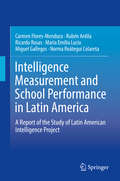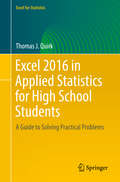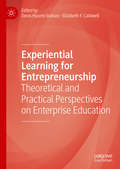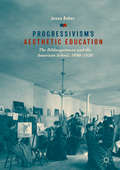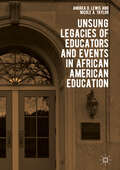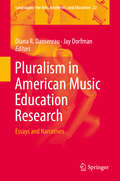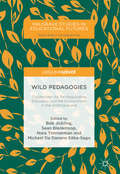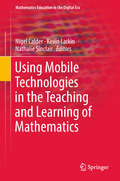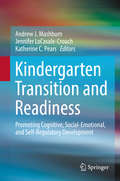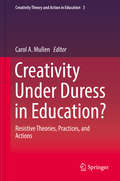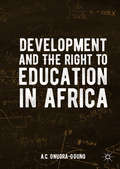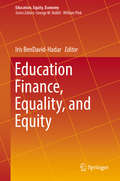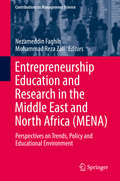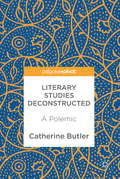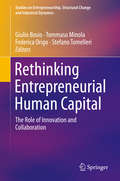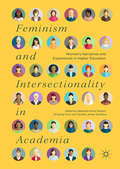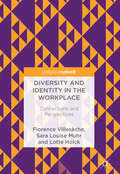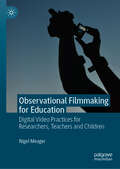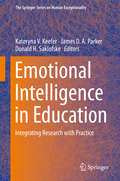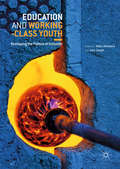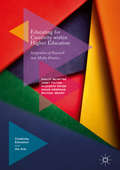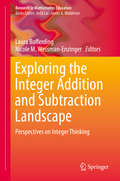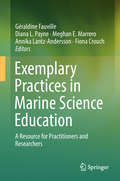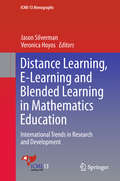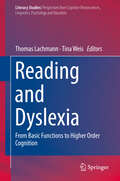- Table View
- List View
Intelligence Measurement and School Performance in Latin America: A Report of the Study of Latin American Intelligence Project
by Carmen Flores-Mendoza Rubén Ardila Ricardo Rosas María Emilia Lucio Miguel Gallegos Norma Reátegui ColaretaThis book presents the results of the most complete and updated assessment of cognitive resources of students in Latin America: the Study of Latin American Intelligence (SLATINT). During four years, top researchers of the region used a standardized set of cognitive measures to assess 4,000 students aged between 14 and 15 years from six countries: Brazil, Argentina, Mexico, Chile, Colombia and Peru. The data collected and now analyzed in this volume is a first step to understand the human cognitive capital of the region, a crucial resource for any country today. Intelligence research has shown that the cognitive skills of a population are strongly associated with the school performance of its students and the development of a nation. This makes Intelligence Measurement and School Performance in Latin America a valuable tool both for Latin American researchers and authorities engaged in the improvement of each country’s human resources and for psychologists, educators and other social scientists dedicated to the study of the impact of intelligence in the development of nations.
Excel 2016 in Applied Statistics for High School Students: A Guide To Solving Practical Problems (Excel For Statistics Ser.)
by Thomas J. QuirkThis textbook is a step-by-step guide for high school, community college, or undergraduate students who are taking a course in applied statistics and wish to learn how to use Excel to solve statistical problems. All of the statistics problems in this book will come from the following fields of study: business, education, psychology, marketing, engineering and advertising. Students will learn how to perform key statistical tests in Excel without being overwhelmed by statistical theory. Each chapter briefly explains a topic and then demonstrates how to use Excel commands and formulas to solve specific statistics problems. This book gives practice in using Excel in two different ways: (1) writing formulas (e.g., confidence interval about the mean, one-group t-test, two-group t-test, correlation) and (2) using Excel’s drop-down formula menus (e.g., simple linear regression, multiple correlations and multiple regression, and one-way ANOVA). Three practice problems are provided at the end of each chapter, along with their solutions in an Appendix. An additional Practice Test allows readers to test their understanding of each chapter by attempting to solve a specific statistics problem using Excel; the solution to each of these problems is also given in an Appendix. This book is a tool that can be used either by itself or along with any good statistics book. Includes 166 illustrations in color Suitable for high school and community college students.
Experiential Learning for Entrepreneurship: Theoretical and Practical Perspectives on Enterprise Education
by Elizabeth F. Caldwell Denis Hyams-SsekasiThis topical new book provides an illuminating overview of enterprise education, and poses the question as to whether current establishments have adequate systems in place to prepare students for the world of work. Addressing the increasing need for graduates with practical skills and expertise in the labour market, this collection of insightful chapters analyses the opportunities that are available for aspiring entrepreneurs to develop enterprise skills and experience key aspects of starting and running a business, whilst in a supported environment such as an educational program or incubator scheme. With comprehensive discussion of higher education initiatives and empirical examples of experiential learning in the workplace, this book is an important and timely read for those researching business enterprise, entrepreneurship and higher education more generally.
Progressivism's Aesthetic Education: The Bildungsroman and the American School, 1890–1920
by Jesse RaberDuring the Progressive Era in the United States, as teaching became professionalized and compulsory attendance laws were passed, the public school emerged as a cultural authority. What did accepting this authority mean for Americans’ conception of self-government and their freedom of thought? And what did it mean for the role of artists and intellectuals within democratic society? Jesse Raber argues that the bildungsroman negotiated this tension between democratic autonomy and cultural authority, reprising an old role for the genre in a new social and intellectual context. Considering novels by Abraham Cahan, Willa Cather, and Charlotte Perkins Gilman alongside the educational thought of John Dewey, the Montessorians, the American Herbartians, and the social efficiency educators, Raber traces the development of an aesthetics of social action. Richly sourced and vividly narrated, this book is a creative intervention in the fields of literary criticism, pragmatic philosophy, aesthetic theory, and the history of education.
Unsung Legacies of Educators and Events in African American Education
by Andrea D. Lewis Nicole A. TaylorThis book describes the contributions of twenty-two educators and events that have shaped the field of education, often receiving little to no public recognition, including: Edmonia Godelle Highgate, Nannie Helen Burroughs, Selena Sloan Butler, Alonzo Aristotle Crim, Sabbath Schools, and African American Boarding Schools. These individuals and events have established and sustained education in communities across the United States. This book will help foster a renewed sense of importance both for those considering teaching and for teachers in classrooms across the country.
Pluralism in American Music Education Research: Essays and Narratives (Landscapes: the Arts, Aesthetics, and Education #23)
by Diana R. Dansereau Jay DorfmanThis volume examines pluralism in light of recent music education research history and pluralistic approaches in practice. Pluralistic research holds the potential to blend frameworks, foundations, methods, and analysis protocols, and leads to a sophisticated understanding of music teaching and learning. This blending could take place in a range of contexts that may span an individual study to a lifelong research agenda. Additionally, pluralistic ideals would guide the addressing of questions as a community. The volume also illuminates the work of innovative music education researchers who are constructing pluralistic research studies and agendas, and advocate for the music education profession to embrace such an approach in order to advance shared research goals. The ramifications of this transformation in music education research are a subject of discussion, including the implications for researcher education and the challenges inherent in conducting and disseminating such research.
Wild Pedagogies: Touchstones for Re-Negotiating Education and the Environment in the Anthropocene (Palgrave Studies in Educational Futures)
by Bob Jickling Sean Blenkinsop Nora Timmerman Michael De Danann Sitka-SageThis book explores why the concept of wild pedagogy is an essential aspect of education in these times; a re-negotiated education that acknowledges the necessity of listening to voices in a more than human world, and (re)learning how to dwell in a place. As the geological epoch inexorably shifts to the Anthropocene, the authors argue that learning to live in and engage with the world is increasingly crucial in such times of uncertainty. The editors and contributors examine what wild pedagogy can truly become, and how it can be relevant across disciplinary boundaries: offering six touchstones as working tools to help educators forge an onward path. This collaborative work will be of interest to students and scholars of wild pedagogies, alternative education and the Anthropocene, and for all those engaged in re-wilding education.
Using Mobile Technologies in the Teaching and Learning of Mathematics (Mathematics Education in the Digital Era #12)
by Nathalie Sinclair Nigel Calder Kevin LarkinMobile technologies influence the way that we interact with the world, the way that we live. We use them for communication, entertainment, information and research. In education settings, there has been substantial investment in mobile devices, often without a concomitant investment in developing pedagogy and practices. With mobile technologies evolving rapidly, and the number of educational apps growing, there is a need for research into how they facilitate mathematics learning. Such research is of particular importance regarding how such devices may be used to open up new ways of envisaging mathematics and mathematics education, and to help develop conceptual rather than procedural or declarative knowledge. This volume draws upon international research and reports on a range of research projects that have incorporated mobile technologies for mathematics education. It presents research on the use of mobile technologies, such as iPads, iPods, iPhones, Androids, and Tablets, across a diverse range of cultures, year levels and contexts. It examines the ways in which mobile technologies, including apps, might influence students’ engagement, cognition, collaboration and attitudes, through the reshaping of the learning experience. In addition, the book presents appropriate ways to integrate mobile technologies into teaching and learning programmes. It is a significant reference book for those involved with teaching mathematics or using mobile technologies in education, while also offering insights and examples that are applicable to the use of digital technologies in education generally.
Kindergarten Transition and Readiness: Promoting Cognitive, Social-Emotional, and Self-Regulatory Development
by Andrew J. Mashburn Jennifer LoCasale-Crouch Katherine C. PearsThis book presents a comprehensive overview of children’s transitions to kindergarten as well as proven strategies that promote their readiness. It presents theories and research to help understand children’s development during the early childhood years. It describes evidence-based interventions that support children in developmental areas essential to school success, including cognitive, social-emotional, and self-regulatory skills. Chapters review prekindergarten readiness programs designed to promote continuity of learning in anticipation of the higher grades and discuss transitional concerns of special populations, such as non-native speakers, children with visual and other disabilities, and children with common temperamental issues. The volume concludes with examples of larger-scale systemic approaches to supporting children’s development during the transition to kindergarten, describing a coherent system of early childhood education that promotes long-term development. Featured topics include:Consistency in children’s classroom experiences and implications for early childhood development.Changes in school readiness in U.S. kindergarteners.Effective transitions to kindergarten for low-income children.The transition into kindergarten for English language learners.The role of close teacher-child relationships during the transition into kindergarten.Children’s temperament and its effect on their kindergarten transitions.Kindergarten Transition and Readiness is a must-have resource for researchers, clinicians and related professionals, and graduate students in child and school psychology, educational psychology, social work, special education, and early childhood education.
Creativity Under Duress in Education?: Resistive Theories, Practices, and Actions (Creativity Theory and Action in Education #3)
by Carol A. MullenCreativity Under Duress in Education? introduces a new framework—creativity under duress in education. Leading creativity researchers and educational scholars discuss creative theory and practice from an educational lens that is provocative. Across international contexts, this book combines insights from creativity and educational research; rich illustrations from classrooms, schools, and other professional settings, and practical ideas and strategies for how anyone invested in education can support creative teaching and learning. Readers will encounter diverse perspectives from an international cast of authors exploring cutting-edge ideas for creativity and innovation as a foremost priority for economies in the new millennium. At the same time, they consider forces of authority, control, and constraint that impact creative education and innovation within educational systems, extending to the professions. Educators and those interested in the future of education are vitally important to this conversation around research-based and practical analyses of creativity in and beyond the classroom. Addressed are these major issues: (1) creativity frameworks of theory and action in education, (2) research investigations into creativity and education, and (3) applications of creativity theory in real-world practice.Dynamic, this book presents a bridge between draconian contexts of assessment and explosive creativity in diverse places. A key contribution of the volume is its validation and promotion of creativity and innovation for students, teachers, professors, leaders, employers, policymakers, and others seeking ways to profoundly improve learning and transform education. In tackling the seemingly irreconcilable issues of creativity and accountability in K–12 institutions, higher education, and policy circles, worldwide, this work offers a message that is both cautionary and inspiring. Book editor Carol A. Mullen, PhD, is Professor of Educational Leadership at Virginia Tech, Virginia, USA. A twice-awarded Fulbright Scholar to China (2015) and Canada (2017), she was honored with the 2016 Jay D. Scribner Mentoring Award from the University Council for Educational Administration. She is author of Creativity and Education in China (2017) and co-editor of Education policy perils (2016).
Development and the Right to Education in Africa
by A.C. Onuora-OgunoThis book is about the right to basic education and its impact on development in Africa. It focuses on the elusive subject of litigating the right to education by examining jurisprudence from select African countries and India. The project further analyses the various challenges that impede access to education, with the attendant lack of political will to curb corruption, and calls for the building of strong institutions and the involvement of both state and non-state actors in driving development via education. It also covers the scope for legal practitioners and policy makers, and supports institutional framework in realizing the right to basic education.
Education Finance, Equality, and Equity (Education, Equity, Economy Ser. #5)
by Iris BenDavid-HadarThis volume revisits educational equality and equity issues, especially, in education finance-related topics consisting of 15 chapters and organized in two parts. The first part of the volume entitled “Education Finance”, focuses on equity aspects of resource allocation and its influence on education. The second part, entitled “Educational Equality and Equity”, focuses on the conceptualization, and the measurements of educational inequity, and inequality with special emphasis on the cost of inequality. The field of education finance has been significantly influencing policy-makers in many countries in recent years. This volume is focused on equity and equality in education finance in an international frame. This book would be of interest to (1) scholars at the fields of education finance, economics of education, and educational policy, (2) graduate students at the course of school finance or economics of education, and (3) local and global policy makers at the fields of education policy, and education finance.
Entrepreneurship Education and Research in the Middle East and North Africa: Perspectives on Trends, Policy and Educational Environment (Contributions to Management Science)
by Nezameddin Faghih Mohammad Reza ZaliThis contributed volume explores and reveals the new developments, dynamics and recommendations for entrepreneurship education in the Middle East and North Africa (MENA) region. Presenting papers by respected experts in the field, it shares essential insights on the status quo of entrepreneurial education and training programs, the characteristics and motivations of early stage entrepreneurs, and the regional framework conditions in MENA. The book closes with a bibliometric perspective on the trends in the entrepreneurship research and education being developed in MENA.
Literary Studies Deconstructed: A Polemic
by Catherine ButlerLiterary Studies Deconstructed critiques the state of Literary Studies in the modern university and argues for its comprehensive reconstruction. It argues that Literary Studies as currently practised avoids engaging with much of literary experience and prioritises instead the needs of critics as a professional community: to teach and assess students, to demonstrate the creation of knowledge, and to meet the demands of governments, funders and other bodies. The result is that many areas centrally important to lay readers are largely omitted from critical discussion. Moreover, critical writing and its conventions are framed so as to mask and repress the subject’s contradictions. This lively and provocative book will be of interest to undergraduate and postgraduate students with an interest in the critical profession or literary theory, as well as to Literary Studies academics.
Rethinking Entrepreneurial Human Capital: The Role of Innovation and Collaboration (Studies on Entrepreneurship, Structural Change and Industrial Dynamics)
by Giulio Bosio Tommaso Minola Federica Origo Stefano TomelleriThis book focuses on the specific traits and nature of entrepreneurial human capital and the extent to which it can be stimulated by entrepreneurship education – especially when these activities combine collaborative practices and innovation. It includes a comprehensive collection of articles on how entrepreneurship education can be structured, providing theoretical reflections as well as empirical evidence. As such it contributes to the ongoing debate on the teachability of entrepreneurial skills and the role of innovation and collaboration in the design of educational programs that aim to spread entrepreneurial human capital.
Feminism and Intersectionality in Academia: Women’s Narratives and Experiences in Higher Education
by Stephanie Anne Shelton Jill Ewing Flynn Tanetha Jamay GroslandThis edited volume explores the diversities and complexities of women’s experiences in higher education. Its emphasis on personal narratives provides a forum for topics not typically found in in print, such as mental illness, marital difficulties, and gender identity. The intersectional narratives afford typically disenfranchised women opportunities to share experiences in ways that de-center standard academic writing, while simultaneously making these stories accessible to a range of readers, both inside and outside higher education.
Diversity and Identity in the Workplace: Connections and Perspectives
by Florence Villesèche Sara Louise Muhr Lotte HolckExamining the theoretical connections between identity and diversity, this new book explores how diversity management practices can be better informed by an enhanced understanding of the relationship between the two fields. Highlighting the relevance of identity to diversity studies, the authors concentrate on three key areas: social identity theory; critical perspectives on identity; and poststructuralist understandings. With the aim of fueling future research, this insightful book outlines a detailed research agenda and offers practical suggestions. Not only useful to academics, this book also seeks to encourage policy-makers and HR managers to develop current practices and make more research-informed management decisions.
Observational Filmmaking for Education: Digital Video Practices for Researchers, Teachers and Children (Creativity, Education and the Arts)
by Nigel MeagerThis book places observational filmmaking in the context of the rapidly developing landscape of creativity and arts based research in education. The author uses observational filmmaking as a lens to address debates surrounding video based and arts based research. Utilising the work of Dewey and Deleuze as the theoretical underpinnings of the volume, this is combined with numerous practical examples of observational filmmaking in schools. The author argues that observational video camera and editing techniques combine careful observation with rigorous visual analysis: they place sensory, affectual and aesthetic qualities in experience centre stage. While observational filmmaking in itself has enormous potential as a methodology for education research, it may also become a fulcrum for children’s learning. Children record their experiences in the world around them as they look carefully with a video camera. This pioneering yet practical book will be of interest and value to students and scholars of creativity, learning, and education research methods, as well as constituting a useful guide for teachers, arts practitioners and education policy makers.
Emotional Intelligence in Education: Integrating Research with Practice (The Springer Series on Human Exceptionality)
by James D. Parker Donald H. Saklofske Kateryna V. KeeferThis book highlights current knowledge, best practices, new opportunities, and difficult challenges associated with promoting emotional intelligence (EI) and social-emotional learning (SEL) in educational settings. The volume provides analyses of contemporary EI theories and measurement tools, common principles and barriers in effective EI and SEL programming, typical and atypical developmental considerations, and higher-level institutional and policy implications. It also addresses common critiques of the relevance of EI and discusses the need for greater awareness of sociocultural contexts in assessing and nurturing EI skills. Chapters provide examples of effective EI and SEL programs in pre-school, secondary school, and university contexts, and explore innovative applications of EI such as bullying prevention and athletic training. In addition, chapters explore the implications of EI in postsecondary, professional, and occupational settings, with topics ranging from college success and youth career readiness to EI training for future educators and organizational leaders. Topics featured in this book include: Ability and trait EI and their role in coping with stress, academic attainment, sports performance, and career readiness.Implications of preschoolers’ emotional competence for future success in the classroom.Understanding EI in individuals with exceptionalities.Applications of school-based EI and SEL programs in North America and Europe.Policy recommendations for social-emotional development in schools, colleges and universities.Developing emotional, social, and cognitive competencies in managers during an MBA program.Emotional intelligence training for teachers.Cross-cultural perspective on EI and emotions. Emotional Intelligence in Education is a must-have resource for researchers, professionals, and policymakers as well as graduate students across such disciplines as child and school psychology, social work, and education policy.
Education and Working-Class Youth: Reshaping The Politics Of Inclusion
by John Smyth Robin SimmonsThis book provides an inclusive and incisive analysis of the experiences of working-class young people in education. While there is an established literature on education and the working class stretching back decades, comparatively there has been something of a neglect of class-based inequality – with questions of gender, ‘race’ and other forms of identity attracting significant attention. However, events including Britain's 2016 decision to leave the European Union, have thrown social class into sharp focus, both in the UK and elsewhere. Featuring leading thinkers in the sociology of education, this book examines the different ways in which young people relate to various parts of the education system, including different forms of schooling, post-compulsory and university education. They maintain that the issue of social class goes beyond the walls of specific institutions to affect young people in a variety of ways: not only in the UK, but across the globe. This book will be of great value and interest to students and scholars of the sociology of education, working-class youth, and equality of opportunity.
Educating for Creativity within Higher Education: Integration of Research into Media Practice (Creativity, Education and the Arts)
by Susan Kerrigan Phillip McIntyre Janet Fulton Elizabeth Paton Michael MeanyThis book provides innovative insights into how creativity can be taught within higher education. Preparing students for employment in a dynamic set of global creative industries requires those students to not only be resilient and entrepreneurial, but also to be locally focused while being globally aware. Therefore it is imperative that they acquire a thorough understanding of creative processes and practice as they try to keep pace with worldwide digital trends. As the creation of media messages is a fundamental aspect of global creative industries, and that numerous concerns practitioners face are based upon a certain understanding of creativity, the authors propose an exploration of what creativity is in terms of research, and then apply it pedagogically. Drawing on extensive empirical research, the authors pose the thought-provoking question of whether creativity can be taught. This volume will be of interest to both students and scholars of creativity and higher education as well as to creatively-based practitioners more widely.
Exploring the Integer Addition and Subtraction Landscape: Perspectives on Integer Thinking (Research in Mathematics Education)
by Laura Bofferding Nicole M. Wessman-EnzingerOver the past few decades there has been increased interest in how students and teachers think and learn about negative numbers from a variety of perspectives. In particular, there has been debate about when integers should be taught and how to teach them to best support students’ learning. This book brings together recent work from researchers to illuminate the state of our understanding about issues related to integer addition and subtraction with a goal of highlighting how the variety of perspectives support each other or contribute to the field in unique ways. In particular, this book focuses on three main areas of integer work: students’ thinking, models and metaphors, and teachers’ thinking. Each chapter highlights a theoretically guided study centered on integer addition and subtraction. Internationally known scholars help connect the perspectives and offer additional insights through section commentaries. This book is an invaluable resource to those who are interested in mathematics education and numerical thinking.
Exemplary Practices in Marine Science Education: A Resource for Practitioners and Researchers
by Géraldine Fauville Diana L. Payne Meghan E. Marrero Annika Lantz-Andersson Fiona CrouchThis edited volume is the premier book dedicated exclusively to marine science education and improving ocean literacy, aiming to showcase exemplary practices in marine science education and educational research in this field on a global scale. It informs, inspires, and provides an intellectual forum for practitioners and researchers in this particular context. Subject areas include sections on marine science education in formal, informal and community settings. This book will be useful to marine science education practitioners (e.g. formal and informal educators) and researchers (both education and science).
Distance Learning, E-Learning and Blended Learning in Mathematics Education: International Trends in Research and Development (ICME-13 Monographs)
by Jason Silverman Veronica HoyosThis book builds on current and emerging research in distance learning, e-learning and blended learning. Specifically, it tests the boundaries of what is known by examining and discussing recent research and development in teaching and learning based on these modalities, with a focus on lifelong mathematics learning and teaching. The book is organized in four sections: The first section focuses on the incorporation of new technologies into mathematics classrooms through the construction or use of digital teaching and learning platforms. The second section presents a wide range of perspectives on the study and implementation of different tutoring systems and/or computer assisted math instruction. The third section presents four new innovations in mathematics learning and/or mathematics teacher education that involve the development of novel interfaces’ for communicating mathematical ideas and analyzing student thinking and student work. Finally, the fourth section presents the latest work on the construction and implementation of new MOOCs and rich media platforms developed to carry out specialized mathematics teacher education.
Reading and Dyslexia: From Basic Functions To Higher Order Cognition (Literacy Studies #16)
by Thomas Lachmann Tina WeisIn this volume a group of well-known experts of the field cover topics ranging from basic visual and auditory information processing to higher order cognition in reading and dyslexia, from basic research to remediation approaches and from well-established theories to new hypotheses about reading acquisition and causes for its failure. Reading is one of the most intriguing feats human evolution ever came up with. There is no evolutionary basis for reading as such; reading is secondary to language and the result of a complex skill acquisition at the end of which almost all pre-existing cognitive functions are mobilized. With the right instruction and practice most people learn this skill smoothly. Some, however, have problems, despite same opportunities and general cognitive abilities. This developmental dyslexia results from a neuro developmental disorder leading to deficits in reading relevant information processing. But what deficits are these, and can they be trained?
